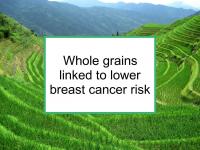Whole grain intake has been linked to reduced risk of breast cancer, especially in comparison with refined grain intake. While the recent emphasis on gluten-free foods and paleo diets has had the effect of deemphasizing the role of whole grains in a healthy diet, there is no evidence that gluten intake is associated with risk of breast cancer.
Now a large new prospective study has reported that whole grain consumption is associated with reduced risk of premenopausal breast cancer. Brown rice consumption in particular is associated with lower risks of both premenopausal and postmenopausal breast cancer.
Whole grains are a source of dietary fiber and have a lower high glycemic index than refined grains. High intake of dietary fiber has been found to be associated with reduced risk of breast cancer. In addition, whole grains contain chemopreventive micronutrients. For example, brown rice is a good dietary source of selenium, ferulic acid, phytic acid, tricin, and the gamma-tocotrienol form of vitamin E, all of which are associated with reduced breast cancer risk. Pigmented rice (black or red rice) also contains melatonin, cyanidin-3-glucoside, and delphinidin.
Latest research finds brown rice intake linked to lower risk
The prospective study referenced at the beginning of this news story was designed to investigate the influence of whole and refined grains from adolescence onward on breast cancer risk. The study included women in the Nurses' Health Study II. Food questionnaires were used to report grain intakes at baseline in 1991 and every four years thereafter. A total of 3,235 invasive breast cancers were eventually diagnosed by 2013 among 90,516 premenopausal women aged 27 to 44. A total of 44,263 of the study participants provided information concerning their diets in high school; 1,347 breast cancer cases were diagnosed among these women. The analysis was performed while adjusting for known breast cancer risk factors.
Intake of whole grain foods during adulthood was found to be associated with lower premenopausal, but not postmenopausal, breast cancer risk. Women with the highest consumption of whole grains (top fifth or quintile of intake) had an 18% lower risk of premenopausal breast cancer than women in with the lowest intake (lowest quintile). However, the association lost statistical significance after taking account fiber intake. The average of adolescent and early adulthood whole grain food consumption was also associated with lower premenopausal breast cancer risk, but the association was not as strong. Refined grain intake was not found to be associated with risk of breast cancer overall.
Most tested individual foods were not associated with risk of breast cancer. However, brown rice consumption during adulthood was found to be associated with lower risk of overall and premenopausal breast cancer. On the other hand white bread intake was associated with increased overall breast cancer risk, as well as breast cancer both before and after menopause. Pasta intake was inversely associated with risk of breast cancer overall. The authors conclude that whole grain consumption may be associated with lower risk of breast cancer before menopause. This association may be linked to the fiber found in whole grain foods.
Please see our articles on fiber and glycemic load for more information.
